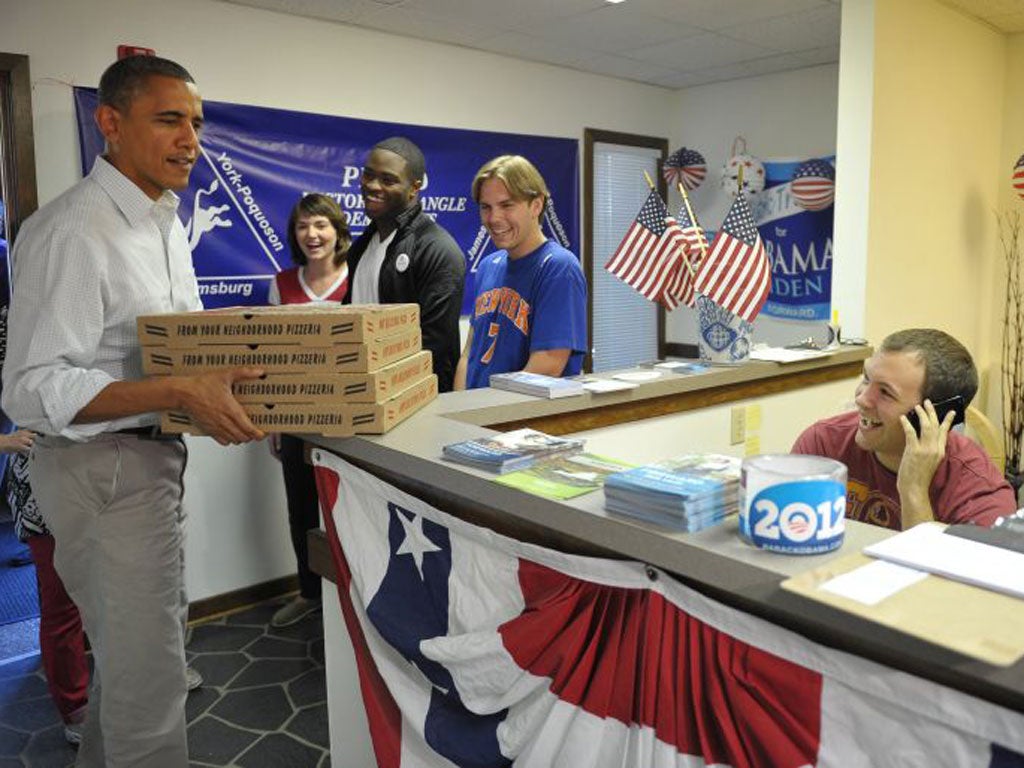Youth vote still favours Obama but his 'novelty factor' is gone

Your support helps us to tell the story
From reproductive rights to climate change to Big Tech, The Independent is on the ground when the story is developing. Whether it's investigating the financials of Elon Musk's pro-Trump PAC or producing our latest documentary, 'The A Word', which shines a light on the American women fighting for reproductive rights, we know how important it is to parse out the facts from the messaging.
At such a critical moment in US history, we need reporters on the ground. Your donation allows us to keep sending journalists to speak to both sides of the story.
The Independent is trusted by Americans across the entire political spectrum. And unlike many other quality news outlets, we choose not to lock Americans out of our reporting and analysis with paywalls. We believe quality journalism should be available to everyone, paid for by those who can afford it.
Your support makes all the difference.Never mind November. For the nearly 30,000 students enrolled at Iowa State University, the chance to choose between Mitt Romney and Barack Obama comes now. Starting today and ending on Friday, they will be encouraged to cast their ballots at early voting stations dotted across the campus.
That turnout is strong among young Americans is especially important for Mr Obama, who was helped to victory in 2008 by a wave of enthusiasm for his candidacy among first-time voters. It is why he was here for a rally in late August while the Republicans were staging their convention in Florida and why he has visited other major campuses across the country since, including Ohio State University last week.
Yesterday, both camps were hurriedly preparing for tomorrow night's second presidential debate, which after Mr Romney's resounding victory during their first encounter two weeks ago, becomes the most important date in the race so far.
Mr Romney's officials accept, however, that winning the youth vote is beyond their reach but they mean to make inroads on the assumption that the near-worship Mr Obama elicited last time around will not be repeated. Rich Beeson, the campaign's political director, noted recently: "We're not going to win them, but we're going to eat into the margins. And those are the margins where they need to run up the score."
Annie Hartnett, 20, an economics and political science student who is also a leader of the campus Democrats, insists there is just as much excitement for Mr Obama as there was four years ago (when she volunteered for the party, although she was too young to vote) but not for the same reasons.
"The first time around for Obama there was a novelty factor, he wanted to be the first black President," she said. "I actually feel more enthusiasm this time but of a different kind. It's for the quality of what we are being asked to vote for. Obama has been good to us."
She cites his pro-gay stance, his commitment to keep student loan interest rates low, and his healthcare reforms that allow students to stay on their parents' insurance until they are 26.
Certainly, there is little evidence of the students at Iowa State being disengaged. The campus calendar has been strewn with student debates ahead of the start of voting today, opinion articles have appeared in the Iowa State Daily, the campus paper, and there was the President's visit.
"I am beginning to dream about it and frankly I am getting a little overwhelmed," said Zach Houboug, 20, a landscape design student who plans to vote for Mr Romney. "I will be relieved when it's all over." His friend, Joe Arentson, also a Republican, nods. "You are kind of swarmed by the Democrats. I just keep walking, avoid eye contact, you know. Obama promised change and I haven't seen any change."
Also different this time, says Ms Hartnett, is the ubiquity of social networking. It's not just that sites like Twitter, Tumblr and Facebook will boost turnout; they also give students the chance to instantly verify what the candidates are saying, which Democrats in particular are doing with Mr Romney. "Our generation is the generation of information checking," she reasoned. "We are always on a phone or some kind of device and anything anyone tells us we can immediately check out."
She isn't fazed by the recent tightening of the polls, especially a Pew poll showing support swinging suddenly to Mr Romney. "We are almost never polled. I have never been polled," she said. "If you put the youth vote into that Pew poll, those numbers would be much different."
Join our commenting forum
Join thought-provoking conversations, follow other Independent readers and see their replies
Comments